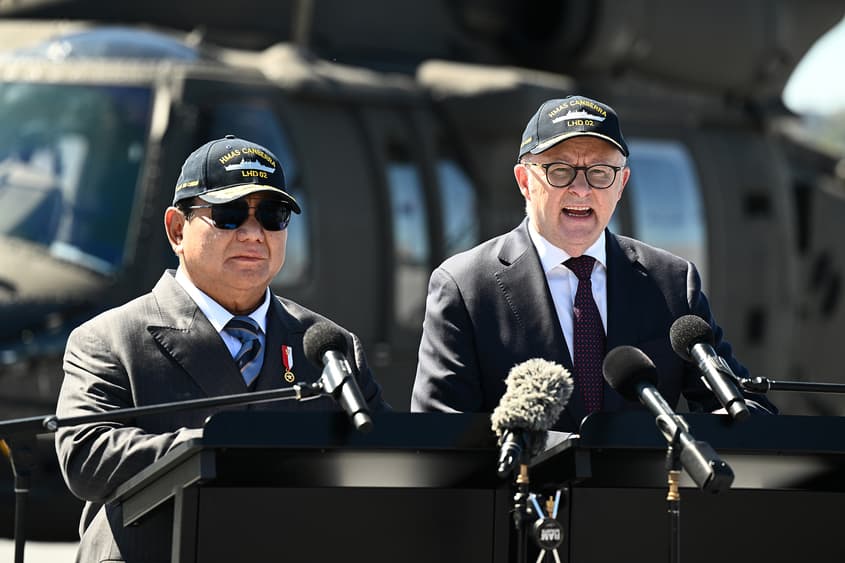Sat 15 Nov 2025 06.00

Australian Prime Minister Anthony Albanese (right) and President of the Republic of Indonesia, Prabowo Subianto announce a security agreement aboard the HMAS Canberra at Fleet Base East, in Sydney, Wednesday, November 12, 2025. (AAP Image/Dan Himbrechts)
Military theatre is a singular artform. From Howard to Albanese, Australian Prime Ministers love it. Nothing, it seems, is more performative or more indicative of their authority. They are in charge, and the nation’s security is guaranteed.
So the sight of Indonesia’s President Prabowo Subianto and Australia’s Prime Minister Albanese, both decked out in HMAS Canberra baseball caps and surrounded by naval personnel in their ceremonial whites, a brass band in tow, is emblematic of steady confidence in a disrupted world. It certainly puts the unspoken and unmentionable threat in its place. Or does it?
The agreement announced on 12 November 2025 will be finalised when Albanese visits Indonesia in January 2026. It is the latest in a series of security arrangements that began in 1995 with an agreement signed by the Foreign Ministers of Australia and Indonesia, Gareth Evans and Ali Alatas. It was Indonesia’s first such international agreement, a departure from the strict non-alignment that had largely defined its security policy since independence in 1945.
It was ably negotiated by the late Allan Gyngell and retired General Peter Gration. Although the agreement specified little more than consultation, it had its critics among Indonesia’s senior foreign affairs and military leaders. Hence it was unsurprising that, following President Suharto’s resignation on 1998 and the collapse of Indonesia’s occupation of East Timor in 1999, the agreement collapsed.
Curiously, another bilateral crisis precipitated the Lombok Treaty in 2006, again signed by the respective Foreign Ministers. It was a direct response by Australia to Indonesian concerns, following the arrival of West Papuan refugees in Australia the previous year, that West Papuan separatists might find be encouraged and supported to fight for and gain independence.
The Lombok Treaty ushed in three defence cooperation agreements in 2012, 2018 and 2024, each signed by the respective Defence Ministers.
Why do we need another security agreement signed at the Prime Ministerial/Presidential level? Basically, Australia and Indonesia are chasing different rainbows. Australia is deep into signal-giving to the unspoken and unmentionable “threat”, China. As with the Australia-PNG Defence Treaty concluded in October 2025 and the yet to be concluded agreement with Vanuatu, Australia wants to limit China’s access and influence in the Pacific, and in Southeast Asia for that matter.
Indonesia does not share Australia’s strategic preoccupation with China. Indonesia wants to make sure that Australia does nothing to undermine its own control over the archipelago, especially in West Papua. Indonesia is acutely aware of Melanesian sympathies for West Papua, and is equally aware of humanitarian support for West Papua among some Australian NGOs. It argues that the security agreement with Australia is not a retreat from non-alignment, but rather a bilateral agreement to shore up its sovereignty and territorial integrity.
The real challenge for Australia and Indonesia is to come to grips with their own long-term future, as Indonesia races up the G20 ladder and Australia slides down, in relative terms. The adjustment in the power relationship has significant economic and political implications for both sides.
Security agreements are essentially what you do when you have nothing else to do. They had some utility a quarter of a century ago. As we saw on 12 November, there is light and movement, but not much substance. Surely we might have moved on a bit by now. Something like a cooperation agreement on the design and development of a new National Capital in Indonesia – if it ever happens – or an agreement on cooperation on climate change would be a truly significant investment in the future, as distinct from an intentionally unbalanced response to China’s emerging economic dominance.
Allan Behm is an international & security affairs advisor at the Australia Institute. He is a former Chief of Staff to Greg Combet, and former senior advisor to Senator Penny Wong.
